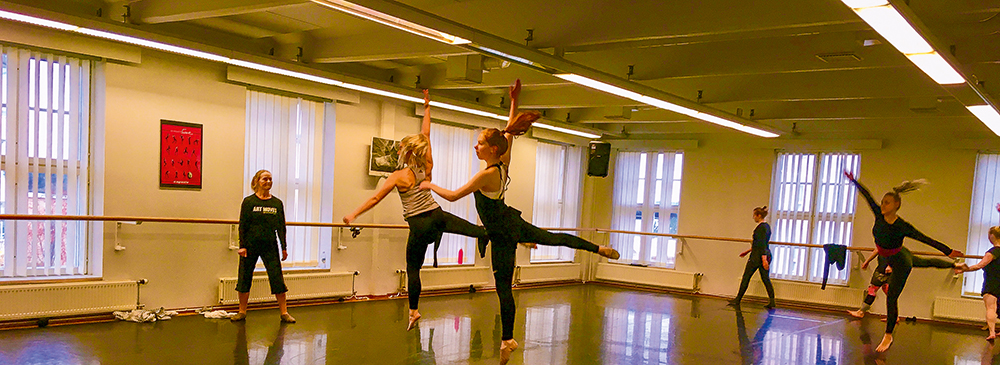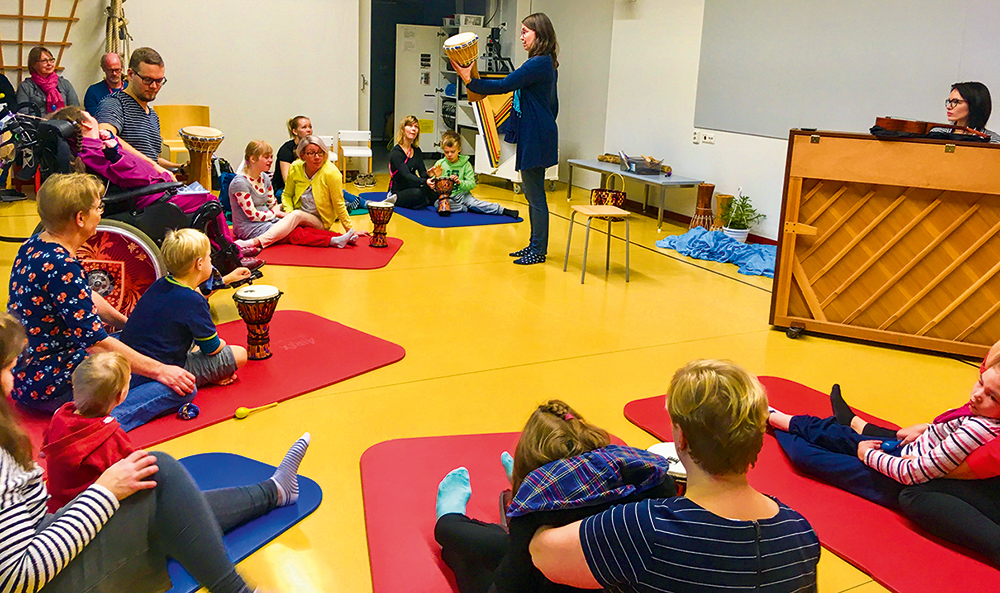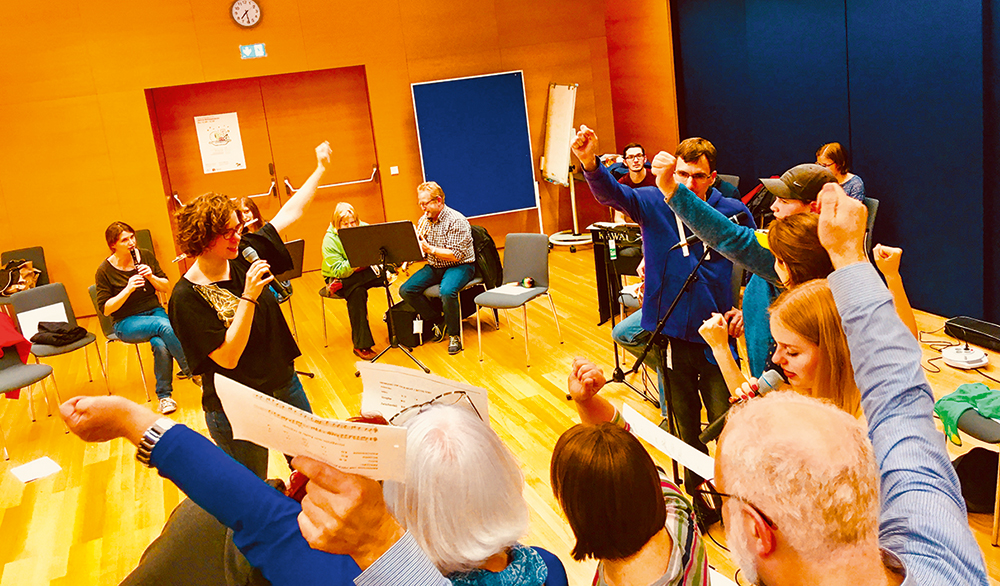Starting Point
The mdw is in very good shape with regard to diversity, intersectionality, barrier-free access, and inclusion. Alongside the Vice Rectorate for Organisational Development, Gender, & Diversity, the Administrative Department for Equality, Gender Studies, and Diversity, and the Representative for People with Disabilities, there’s also a University Senate working group on barrier-free access. And our university’s curricula, above all those music education degree programmes, pay great attention to the theme of inclusive music pedagogy. Recent conferences on inclusive music-making were well attended, as was the mdw’s Inclusive Sound Festival. The mdw’s band “All Stars Inclusive” was awarded the Diversitas Prize by the Austrian state in 2016. And a universally binding cultural shift in favour of social inclusion and diversity has been called for by the UN Convention on the Rights of Persons with Disabilities, Austria’s National Plan of Action for Persons with Disabilities (passed in 2012), and the Austrian University Development Plan for the period of 2016–2021.

Participating Project Partners
It was thus only logical for the mdw to respond positively to a request by Finnish colleagues to join forces in formulating an application to conduct the Erasmus+ project “Inclusive Pedagogy in Arts – Europe”. Participating institutions include the Kuopio Conservatory in Finland with its director Esko Kauppinen and the two instrumental pedagogues Annukka Knuuttila and Elina Vetoniemi, Savonia University of Applied Sciences’ School of Music and Dance in Kuopio with dance pedagogue Hanna Turunen, the Siauliai First Music School of Lithuania with instrumental pedagogues Kristina Kupryte and Jurgita Bubiene, Siauliai University in Lithuaneia with researchers Diana Straksiene and Edita Musneckiene, the University of Vechta in Germany with education researcher Roland Hafen and music education PhD candidate Heidi Zacheja-Düvel, the district music school Kreismusikschule Vechta with music school teacher and popular musician Rainer Wördemann, and the mdw in Austria with music pedagogue and musicologist Beate Hennenberg.
Basic Information
This project, a strategic partnership under Key Action 2, began in September 2017 and is set to run for just under 2 years. Key Action 2 sets education policy priorities such as designing curricula that enable learning across national and sectoral borders. A further priority is to allow the educational content of new curricula to more closely approach the demands of actual professional practice, such as in the fields of instrumental pedagogy, dense pedagogy, and general music education. Furthermore, new learning and teaching methods are to be tried out and ultimately implemented in the interest of easing cross-border recognition of knowledge and working toward more equal opportunities for disadvantaged groups.

Procedure and Objectives
The first step is to develop individual modules on the basis of innovative teaching and learning methods. The heart of this effort at the mdw is the inclusive band “All Stars Inclusive”, in which the students can participate by playing with the band as well as by participating in didactic and/or theoretical seminars. IMP also hosts the website www.musik-inklusiv.at, which provides an overview of further inclusive ensembles all over Austria including a version formulated in easy-to-read language. The expertise of this project’s Finnish participants is in creative dance pedagogy as well as in adaptive, situation-oriented music-making with small and even very small children both at conservatories and in neonatal intensive care units. At the inclusive intermediate school in Kuopion, children with Down syndrome receive wind instrument instruction in small groups several times a week so that they can soon join the school orchestra. The University of Vechta applies the advantages of interdisciplinary teaching to regular school instruction, with the concept of “citizen science” (also referred to as crowd science or crowdsourced science) likewise playing a role. And our colleague Rainer Wördemann, of the district music school in Vechta, offers instrumental instruction for people with disabilities, which is no longer something exceptional among member institutions of the Association of German Music Schools following their “Potsdam Declaration” of 2014.
Inclusive Music-Making Projects in Europe
Our work is inspired by innovative projects related to inclusive music-making: at the Technical University of Dortmund, Susanne Quinten zur Trias leads a course on “Movement, Dance, and Inclusion”. The research emphases of Juliane Gerland at the University of Siegen include music pedagogy as a driver of inclusive development. Robert Wagner, chairman of the Bundesfachausschuss des Verbandes deutscher Musikschulen für Inklusion [Federal Specialist Committee on Inclusion, Association of German Music Schools] and head of the extra-occupational training programme “Instrumentalspiel mit Menschen mit Behinderung an Musikschulen” [Instrumental Music-Making with People with Disabilities at Music Schools] at the Academy of Arts Education in Remscheid, develops discrimination-free, mobile offerings for all music school students. The Free University of Bozen-Bolzano’s Antonella Coppi researches on music education, legality, and social inclusion. Eva Königer of the mdw’s IMP is studying ELEMU, the cooperative project between the Vienna Music Schools and the Vienna School Board that makes it possible for qualified music school teachers to work together with primary school teachers at primary schools. Adriana Di Lorenzo Tillborg researches the relationship between leadership and inclusion as a challenge for Sweden’s arts and music schools. And Shirley Salmon from the Orff Institute in Salzburg coordinates her institution’s emphasis in music and dance in social work and integrative pedagogy.

Supporting Agendas
The Renewed EU Agenda For Higher Education, developed by the Federal Ministry of Education, Science, and Research in 2017 and binding for all Austrian universities, provides a foundation for this project’s approach: university institutions are to contribute to innovation in our society, form knowledge alliances, enter into cooperative arrangements with educational institutions on all levels, and nurture the talents of all students. It may be that we will have more students with individual learning paths in the future, as a consequence of which the need for flexible programmes of study and/or digital technologies may increase. But these challenges aren’t all that daunting, and the fact is that instructors, upon being asked about adjustments they’ve made to their teaching to accommodate our blind students, for instance, are already praising the advantages of E-accessibility compared to older teaching aids.
The Goal in Sight
It’s too early to talk about effects. But as far as the instructors—independent of where they teach—are concerned, they’ll be able to make future use of a number of proven examples in inclusive instrumental and voice instruction, adapting these to their own needs and developing them further in ways that are nuanced and sensitive to diversity. Individually designed curricula—for which students submit their own pre-existing projects, for example—are becoming more important. And more flexible ways of structuring teaching, such as via open distance learning for lectures at which physical presence is not obligatory, could be considered. For students, there should be broader professionally oriented offerings of inclusive didactic and/or artistic subjects. Alternative testing methods are also a topic here, as is further training in sign language—which represents a professional head start for students in the Music Education programme. The tasks here are myriad. What’s certain, though, is that participation in high-quality musical education should be made possible for all interested individuals with provision of the necessary support in the form of appropriate measures being taken to foster talents in accordance with individual needs.
Further informationen on the website of the project:
- www.mdw.ac.at/918 (in German)

